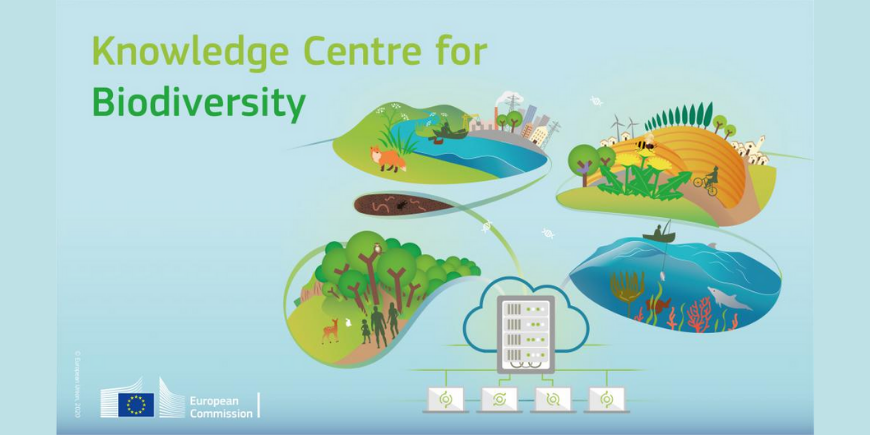The Knowledge Centre for Biodiversity
The European Commission launched a new Knowledge Centre for Biodiversity: a one-stop shop for science-based evidence to protect the natural ecosystems that provide us with food, medicines, materials, recreation and wellbeing.
The Knowledge Centre will make available the latest knowledge about biodiversity to strengthen the impact of EU policies, also helping to monitor the implementation of the EU Biodiversity Strategy for 2030, on the path to a recovery of biodiversity in Europe by the end of the decade.
Commissioner for the Environment, Oceans and Fisheries, Virginijus Sinkevičius said:
"Only what gets measured gets done. If we want to deliver on the EU Biodiversity Strategy, we need to better connect all the dots, and for this we need sound data. Be it on the status of pollinators, environmental impact of pesticides, the value of nature for business or the economic rationale of nature-based solutions. We also need to make full use of the digital transformation, Earth observation and Citizen Science. The new knowledge centre will bring all this together, improving the way we generate and manage biodiversity knowledge."
Commissioner for Innovation, Research, Culture, Education and Youth, responsible for the Joint Research Centre, Mariya Gabriel added:
"Science has a crucial role to play in conserving our biodiversity. Led by our own scientists at the Joint Research Centre, the new Knowledge Centre for Biodiversity will help the European and global research community and policymakers to harvest and make sense of the vast array of information available, streamlining it into effective policies that protect Europe’s ecosystems and the services they provide for European citizens".
The Knowledge Centre for Biodiversity will provide:
- A one-stop shop for key information about biodiversity and the impact of related policies.
- A platform where progress of the EU Biodiversity Strategy for 2030 can be monitored.
- An interface for scientists to network, share research results and channel them more effectively to support EU policies.
Enhancing biodiversity data
Launched during the EU Green Week, the Knowledge Centre will directly address challenges uncovered by the first ever EU-wide ecosystem assessment, produced by the Joint Research Centre. The assessment shows that Europe’s natural areas - from its forests, rivers and lakes to its farmland, urban green spaces and soils - are under increasing pressure.
The authors discovered that a wealth of biodiversity data exists that could help in taking the right action to alleviate these pressures, but that much of it remains unused for a variety of reasons ranging from accessibility to interoperability. As stated for example on page 230, regarding marine data, "the lack of harmonised datasets is also a strong limitation to this study. For example, the composition of stocks in the CFP assessment is not constant from one year to the other and from one Member State to the other".
Several other trends are currently difficult to measure and assess, impacting both the effectiveness and promptness of policy action across Europe. Despite widespread protection of seas in terms of policy framework, these data gaps often limit the analysis of critical trends such as the inputs of nutrients, contaminants, and litter.
The complexity of the current context of biodiversity conservation requires new and improved scientific support to all policymakers. This is where contributions from pivotal research initiatives such as the Knowledge Centre for Biodiversity and Blue-Cloud come in.
Blue-Cloud's contribution to biodiversity by increasing data sharing and usage
In line with the EU goals on enhancing biodiversity, Blue-Cloud is tackling key challenges for marine data while federating existing data infrastructures and promoting FAIR principles (Findability, Accessibility, Interoperability, Reusability) across the marine research community.
One of the five Blue-Cloud real-life demonstrators specifically operates in the field of biodiversity: Zoo- and Phytoplankton Essential Ocean Variables Products. This demonstrator, developed by the Flanders Marine Institute (VLIZ) in collaboration with the Faculty of Sciences at Sorbonne University, is building upon a range of oceanographic data from multiple streams, made interoperable and integrated via the Blue-Cloud framework, in order to produce unique zooplankton and phytoplankton products that will be made available to a wide range of end-users.
Learn more about the Zoo- and Phytoplankton Essential Ocean Variables Products demonstrator
Blue-Cloud is bringing together marine research communities, thanks to the collaboration of top European e-infrastructures, in order to enhance access and discovery of existing multidisciplinary data, ultimately facilitating the development and monitoring of policies related to the ocean.
This process is also involving stakeholders in the co-creation of the Roadmap to 2030, in order to allow all citizens to provide their vision of how the marine ecosystems should be better protected thanks to the availability and collaborative use of data from the marine community.
Get to know the Blue-Cloud real-life demonstrators
Input and quotes taken from the press release on the Knowledge Centre for Biodiversity
